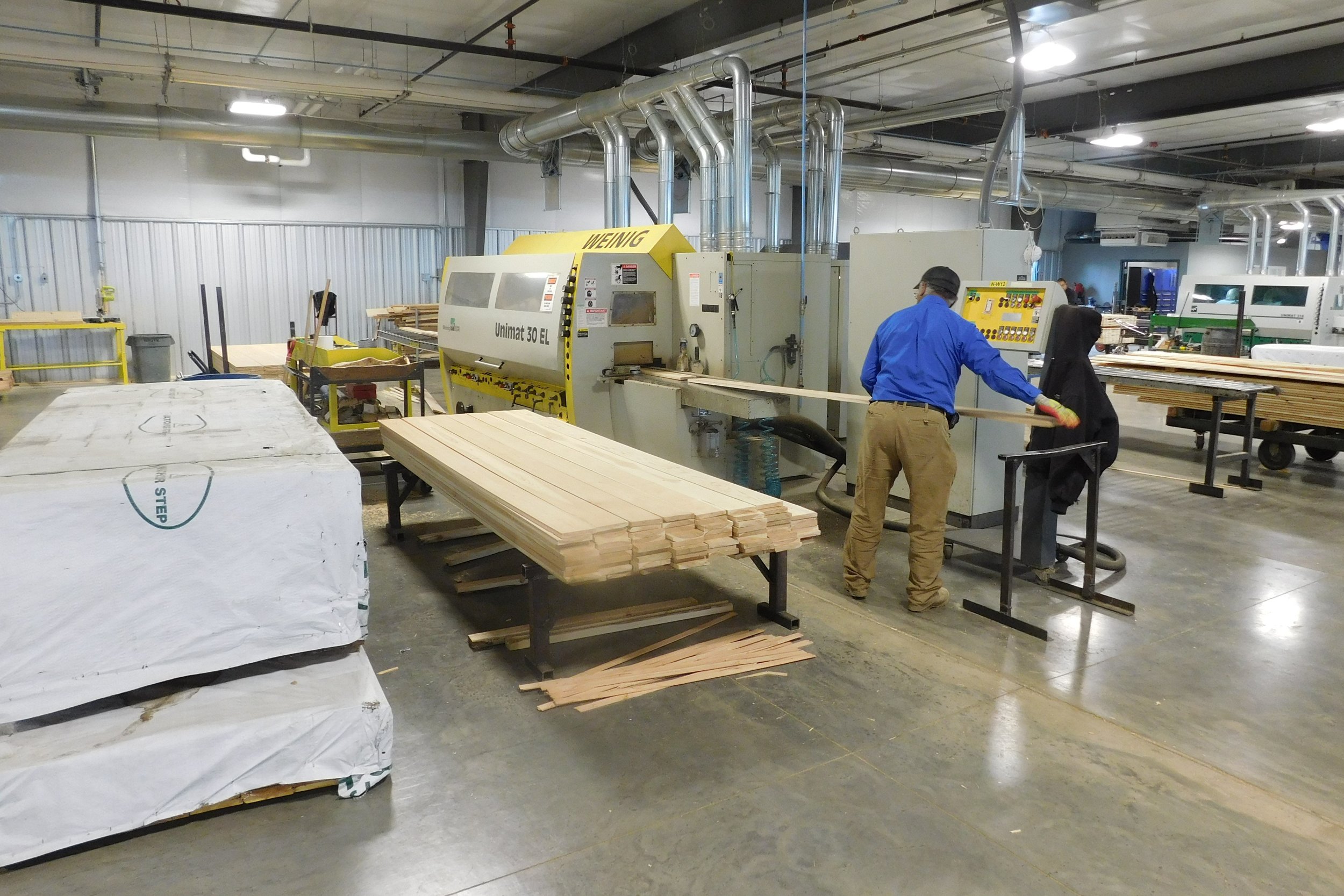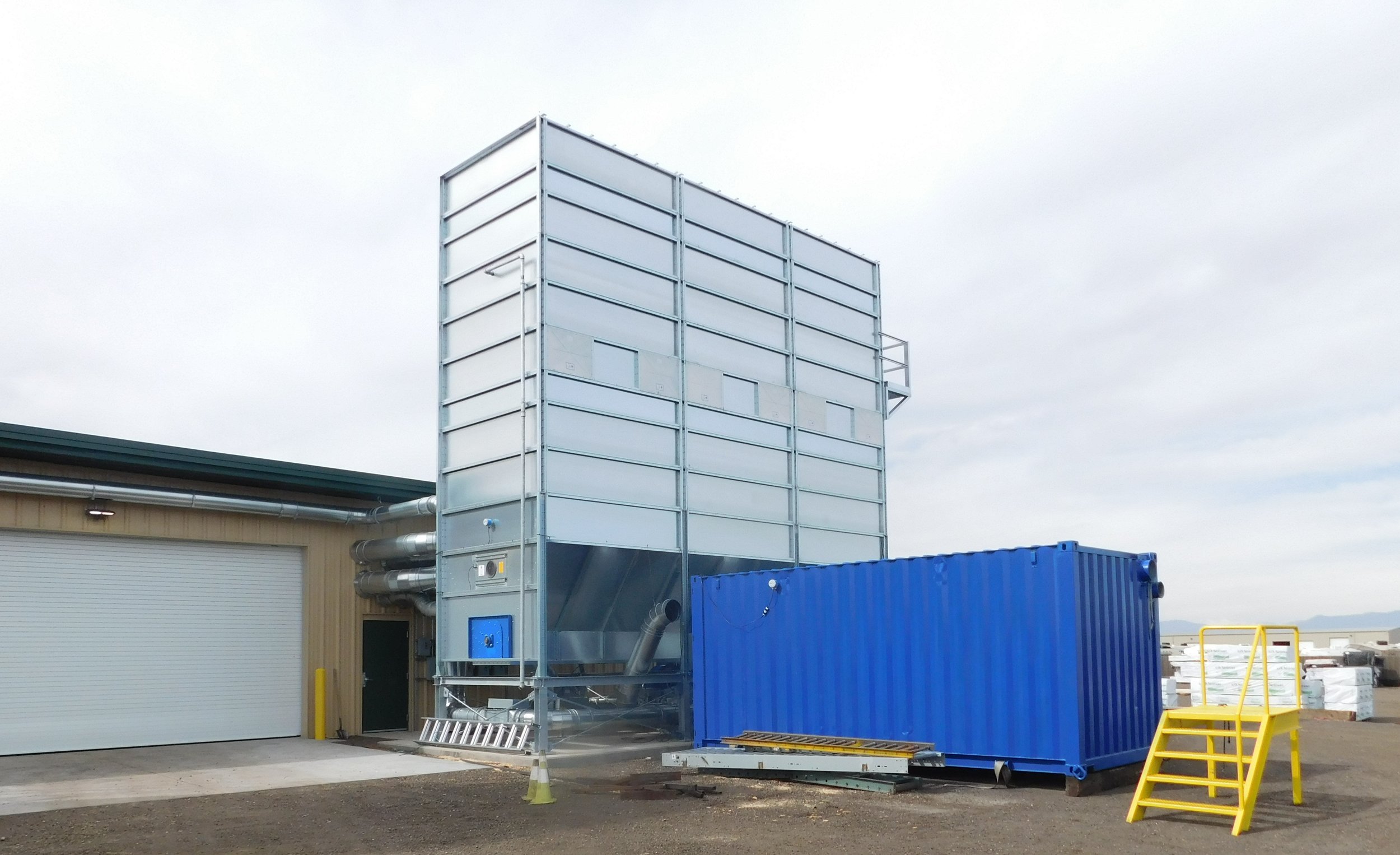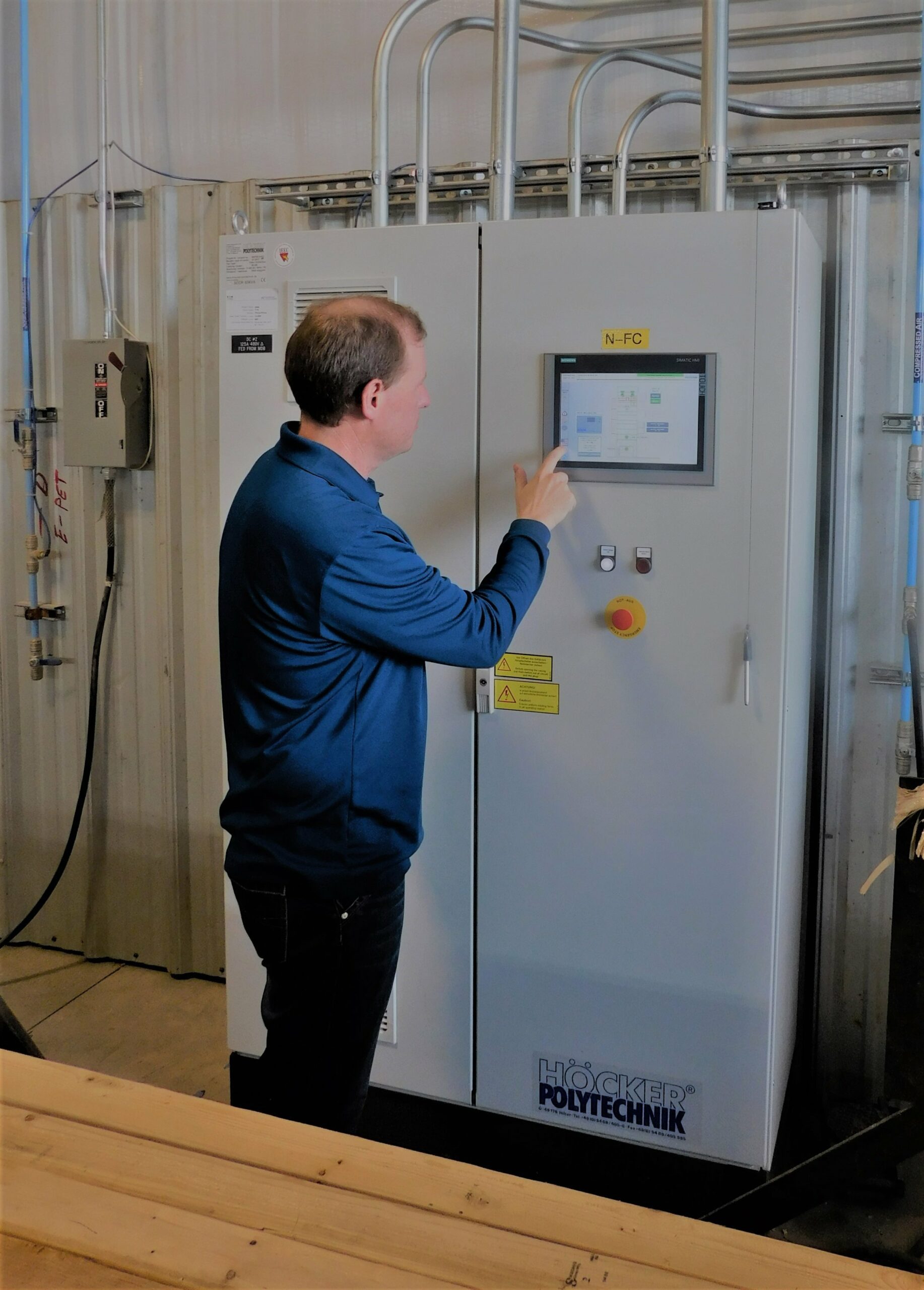0%
Reduction in Gas Bill While Heating 5x the Square Footage0%
Cut in CFM Requirement0+ Minutes
of Productivity Reclaimed Per Machine, Per DayAbout
Originally based in Denver, Colorado, General Building Materials manufactures decorative building products sold through nearly 100 retail lumber yards. In business since 1979, they provide custom woodworking using cedar, pine and Douglas fir to make products that include tongue-and-groove siding, precision-end trim, and mouldings. Their 55,000-square-foot plant is located in Henderson, CO and operated by a 35-member crew.
Products
- MultiStar dust collection 6x6 with briquetter
- MultiStar dust collection 10x6 with airlock
- Briquetter
- Material Separator
- Full environmental boiler
- Zero landfill solution
Turning an Unexpected Change into a Positive for Innovation
General Building Materials (GBM) maintained a plant in the heart of Denver, CO until city development plans presented them with an unexpected need to relocate. “Unfortunately, every one of the city’s plans I looked at seemed to go right through our building,” said Jon Montague, President at General Building Materials.
As a family-owned business, GBM had been in the same location for decades. This forced change was a bit of a shock.
Having to sell their 37,000 square-foot facility in Denver, GBM relocated to a newly-built 55,000 square-foot shop in Commerce City, CO, about 10 minutes from the state capitol, and took this as an opportunity to innovate production.
“Being landlocked in downtown, we knew that ultimately the only way we would be able to grow our capacity would be to move. But it’s one thing to make such a big decision on your own terms and another to be told you have to vacate,” said Montague. “It was very stressful looking for a new facility and trying to service customers while transitioning production. Fortunately, we reached an amicable settlement and Denver was helpful in helping us get resettled.”
“We realized that we could either be very angry about this situation or seize it as an opportunity to jumpstart our business.”
– Russ Lowery, Production Manager, General Building Materials
Searching for a Solution
With the move into a brand-new warehouse, GBM decided to invest in some updates, including state-of-the-art dust collection systems that could meet strict dust collection standards and keep two distinct wood waste streams separate.
With both a cut shop and a custom shop on site, it was necessary to have two different dust collection systems working simultaneously. The cut shop produces more commodity-type products with cut-to-size capabilities for custom projects. The custom shop uses moulders to make made-to-order building products.
The custom shop produces a profitable byproduct sold for horse bedding, but the cut shop waste has no commercial value.
“The shavings from our moulder operations are big and fluffy – perfect for horse bedding,” said Montague. “The byproduct from the cut shop, however, is largely unusable. It’s really fine dust from the saws and grind up from the chipper. About its only use is for mixing with manure.”
Although one system could service the entire plant, with two different types of waste, it was necessary to find an effective solution that addressed both. Höcker North America was the only vendor to propose a two-dust-collector solution to keep the different byproducts separate.

“Höcker addressed our needs by proposing a two-system approach and adding a boiler system to heat our plant using the cut shop waste.”
– Joe Montague, President, General Building Materials
Implementing Change
Transitioning from five independent dust collectors of various makes and models to just two Höcker systems was a significant upgrade GBM, delivering new efficiencies that have helped the company thrive.
The larger of the two systems features four independent motors, which allows the system to achieve an impressive airflow of up to 36,000 CFM. It efficiently works at capturing moulder shavings, which are packaged and sold to an area horse farm.
The smaller system runs on just two motors with a 24,000 CFM capacity. It provides an added benefit to operations at GBM thanks to an integrated briquetter and boiler which turns low-value wood waste into fuel using an automatic auger system. These briquettes provide heat for the entire facility.
Both dust collection systems are equipped with GreCon spark suppression systems to ensure facility and employee safety by preventing fires and dust explosions.

“The old systems did their job but were very inefficient compared to the Höcker collectors. We’re now using maybe 60 percent of the CFM that was required before.”
– Joe Montague, President, General Building Materials
Seeing the Benefits
Streamlining Energy Usage
Previously, the dust collection operation at GBM was an all-or-nothing operation. Either the entire system was up and running, or it wasn’t. It didn’t matter how many machines were in use, so energy was often wasted.
Now, with automated blast gates that sense when a machine is operating, only necessary energy is used.
“With the Höcker system, when you turn on the first machine, the collector only services that one machine so it’s only running at a small percentage of full power,” said Russ Lowery, Production Manager at General Building Materials. “If you turn on another machine, the system ramps up a little more. When you turn a machine off, it adjusts and ramps down accordingly.”
Optimizing Wood Waste for Fuel
“We used to pay about $1,200 a month for gas and only heated 8,000 square feet of the old building during the winter,” said Montague. “Now we’re heating 37,000 square feet under one roof and our average gas bill this past winter was about $200 per month.”
The new boiler system that converts wood waste into fuel has not only dramatically lowered GBM’s monthly gas bill, but it’s helping them close the loop on wood waste.
“Our goal is to use 100 percent of our wood fiber. Any scrap at least eight inches long gets made into survey stakes or other products. Anything smaller than eight inches gets grounded and made into briquettes,” said Montague.
Currently, GBM produces about 250 pounds of briquettes per hour according to Lowery.
Increasing productivity
One of the biggest boosts in productivity since the installation of their Höcker dust collectors comes at the end of the day. Cleanup time as work draws to a close has been cut in half thanks to the collection systems’ design.
“We used to have to shut down all of the machines 30 to 40 minutes at the end of the day to clean up,” said Lowery. “It’s less than half of that now. We’ve gained about 20 minutes of productivity for each machine every day of the week mostly because of the greater efficiency of the new dust collectors. For example, the moulders have a solid pipe that extends down to the cutter head. The waste goes right up the dust pipe. It’s a close, tight system.”
GBM also experienced another time-saver with no longer needing machine downtime to empty dust bins. Employing a multiple box system, dust boxes automatically shift to one that’s empty once a sensor goes off telling the system the current box is almost full.
![JB1_20171218_00042_preview[1] JB1_20171218_00042_preview[1]](https://hockeramerica.com/wp-content/uploads/2024/08/JB1_20171218_00042_preview1-1024x640.jpeg)
“We used to have to shut down all of the machines 30 to 40 minutes at the end of the day to clean up. It’s less than half of that now. We’ve gained about 20 minutes of productivity for each machine every day of the week mostly because of the greater efficiency of the new dust collectors."
– Joe Montague, President, General Building Materials

![JB1_20171218_00020-HDR_preview[1] JB1_20171218_00020-HDR_preview[1]](https://hockeramerica.com/wp-content/uploads/2024/08/JB1_20171218_00020-HDR_preview1.jpeg)
Better Performance, Better Dust Collection
Although the move to the new facility wasn’t entirely planned, Montague and Lowery are able to see the positives the new location brings — including the use of modernized dust collection systems. Lowery said the new systems make for a cleaner, healthier and safer work environment. “Knowing the amount of fine dust that machines like ours produce, and then realizing that none of it is going into the air, just boggles my mind,” said Lowery.
The combined efficiencies of the two Höcker dust collectors make the shop, according to Montague, “10 times better than any wood shop I’ve ever seen.”
This upgrade has also inspired the team to think of future expansion, knowing the existing system is ready to accommodate growth.
“When the time comes that we need to make an even more substantial expansion to our production the Höcker system can grow with us,” said Lowery, “We won’t have to add another dust collection system.”
Turning an Unexpected Change into a Positive for Innovation
General Building Materials (GBM) maintained a plant in the heart of Denver, CO until city development plans presented them with an unexpected need to relocate. “Unfortunately, every one of the city’s plans I looked at seemed to go right through our building,” said Jon Montague, President at General Building Materials.
As a family-owned business, GBM had been in the same location for decades. This forced change was a bit of a shock.
Having to sell their 37,000 square-foot facility in Denver, GBM relocated to a newly-built 55,000 square-foot shop in Commerce City, CO, about 10 minutes from the state capitol, and took this as an opportunity to innovate production.
“Being landlocked in downtown, we knew that ultimately the only way we would be able to grow our capacity would be to move. But it’s one thing to make such a big decision on your own terms and another to be told you have to vacate,” said Montague. “It was very stressful looking for a new facility and trying to service customers while transitioning production. Fortunately, we reached an amicable settlement and Denver was helpful in helping us get resettled.”
“We realized that we could either be very angry about this situation or seize it as an opportunity to jumpstart our business.”
– Russ Lowery, Production Manager, General Building Materials
Searching for a Solution
With the move into a brand-new warehouse, GBM decided to invest in some updates, including state-of-the-art dust collection systems that could meet strict dust collection standards and keep two distinct wood waste streams separate.
With both a cut shop and a custom shop on site, it was necessary to have two different dust collection systems working simultaneously. The cut shop produces more commodity-type products with cut-to-size capabilities for custom projects. The custom shop uses moulders to make made-to-order building products.
The custom shop produces a profitable byproduct sold for horse bedding, but the cut shop waste has no commercial value.
“The shavings from our moulder operations are big and fluffy – perfect for horse bedding,” said Montague. “The byproduct from the cut shop, however, is largely unusable. It’s really fine dust from the saws and grind up from the chipper. About its only use is for mixing with manure.”
Although one system could service the entire plant, with two different types of waste, it was necessary to find an effective solution that addressed both. Höcker North America was the only vendor to propose a two-dust-collector solution to keep the different byproducts separate.

“Höcker addressed our needs by proposing a two-system approach and adding a boiler system to heat our plant using the cut shop waste.”
– Joe Montague, President, General Building Materials
Implementing Change
Transitioning from five independent dust collectors of various makes and models to just two Höcker systems was a significant upgrade GBM, delivering new efficiencies that have helped the company thrive.
The larger of the two systems features four independent motors, which allows the system to achieve an impressive airflow of up to 36,000 CFM. It efficiently works at capturing moulder shavings, which are packaged and sold to an area horse farm.
The smaller system runs on just two motors with a 24,000 CFM capacity. It provides an added benefit to operations at GBM thanks to an integrated briquetter and boiler which turns low-value wood waste into fuel using an automatic auger system. These briquettes provide heat for the entire facility.
Both dust collection systems are equipped with GreCon spark suppression systems to ensure facility and employee safety by preventing fires and dust explosions.

“The old systems did their job but were very inefficient compared to the Höcker collectors. We’re now using maybe 60 percent of the CFM that was required before.”
– Joe Montague, President, General Building Materials
Seeing the Benefits
Streamlining Energy Usage
Previously, the dust collection operation at GBM was an all-or-nothing operation. Either the entire system was up and running, or it wasn’t. It didn’t matter how many machines were in use, so energy was often wasted.
Now, with automated blast gates that sense when a machine is operating, only necessary energy is used.
“With the Höcker system, when you turn on the first machine, the collector only services that one machine so it’s only running at a small percentage of full power,” said Russ Lowery, Production Manager at General Building Materials. “If you turn on another machine, the system ramps up a little more. When you turn a machine off, it adjusts and ramps down accordingly.”
Optimizing Wood Waste for Fuel
“We used to pay about $1,200 a month for gas and only heated 8,000 square feet of the old building during the winter,” said Montague. “Now we’re heating 37,000 square feet under one roof and our average gas bill this past winter was about $200 per month.”
The new boiler system that converts wood waste into fuel has not only dramatically lowered GBM’s monthly gas bill, but it’s helping them close the loop on wood waste.
“Our goal is to use 100 percent of our wood fiber. Any scrap at least eight inches long gets made into survey stakes or other products. Anything smaller than eight inches gets grounded and made into briquettes,” said Montague.
Currently, GBM produces about 250 pounds of briquettes per hour according to Lowery.
Increasing productivity
One of the biggest boosts in productivity since the installation of their Höcker dust collectors comes at the end of the day. Cleanup time as work draws to a close has been cut in half thanks to the collection systems’ design.
“We used to have to shut down all of the machines 30 to 40 minutes at the end of the day to clean up,” said Lowery. “It’s less than half of that now. We’ve gained about 20 minutes of productivity for each machine every day of the week mostly because of the greater efficiency of the new dust collectors. For example, the moulders have a solid pipe that extends down to the cutter head. The waste goes right up the dust pipe. It’s a close, tight system.”
GBM also experienced another time-saver with no longer needing machine downtime to empty dust bins. Employing a multiple box system, dust boxes automatically shift to one that’s empty once a sensor goes off telling the system the current box is almost full.
![JB1_20171218_00042_preview[1] JB1_20171218_00042_preview[1]](https://hockeramerica.com/wp-content/uploads/2024/08/JB1_20171218_00042_preview1-1024x640.jpeg)
“We used to have to shut down all of the machines 30 to 40 minutes at the end of the day to clean up. It’s less than half of that now. We’ve gained about 20 minutes of productivity for each machine every day of the week mostly because of the greater efficiency of the new dust collectors."
– Joe Montague, President, General Building Materials

![JB1_20171218_00020-HDR_preview[1] JB1_20171218_00020-HDR_preview[1]](https://hockeramerica.com/wp-content/uploads/2024/08/JB1_20171218_00020-HDR_preview1.jpeg)
Better Performance, Better Dust Collection
Although the move to the new facility wasn’t entirely planned, Montague and Lowery are able to see the positives the new location brings — including the use of modernized dust collection systems. Lowery said the new systems make for a cleaner, healthier and safer work environment. “Knowing the amount of fine dust that machines like ours produce, and then realizing that none of it is going into the air, just boggles my mind,” said Lowery.
The combined efficiencies of the two Höcker dust collectors make the shop, according to Montague, “10 times better than any wood shop I’ve ever seen.”
This upgrade has also inspired the team to think of future expansion, knowing the existing system is ready to accommodate growth.
“When the time comes that we need to make an even more substantial expansion to our production the Höcker system can grow with us,” said Lowery, “We won’t have to add another dust collection system.”
